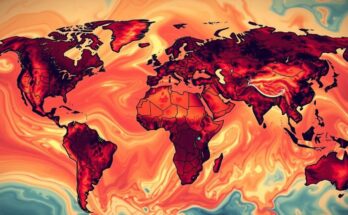The Human Rights Institute hosted a lecture by Aaron Mair, a former Sierra Club president, addressing the intersection of climate change and social justice. Mair highlighted the disproportionate impacts of climate change on marginalized communities and advocated for an intersectional approach. The event coincided with the UN COP 28 summit and emphasized the role of youth activism in enacting meaningful change.
The Human Rights Institute recently hosted a lecture delivered by Aaron Mair, an esteemed alumnus and former president of the Sierra Club, on the intersectionality of climate change and social justice. The event took place at Casadesus Recital Hall and coincided with the recent call to action from the United Nations COP 28 summit, where discussions surrounding climate crisis responses were paramount. Mair emphasized the disproportionate effects of climate change on marginalized communities and underscored the importance of adopting an intersectional lens in addressing these issues. Organized primarily by the institute’s co-directors, Professors David Cingranelli and Alexandra Moore, the lecture aimed to cultivate discussion on environmental concerns. Cingranelli articulated in an email, “Climate change is one of the most significant threats to human dignity,” predicting increased awareness and activism, particularly among college students who have much to lose. With a rich history in environmental advocacy, Mair, the first Black president of the Sierra Club, discussed the urgent need for equitable climate action, pointing out that both urban communities in the United States and nations within the Global South are heavily affected by climate crises. He noted, “We’ve got hundreds of wilderness activists that have been killed… in Africa… in Central America,” highlighting the severe risks that environmental defenders face. Mair drew attention to instances such as Hurricane Katrina, which disproportionately impacted Black, working-class families and worsened economic disparities due to existing discriminatory housing policies. He noted that such disasters often result in “wealth creation off of a crisis on the backs of communities of color.” Mair urged students to take an active role in their communities to foster meaningful social change, advocating that the struggle for justice is both intersectional and intergenerational. He asserted, “…that term, intersectionality, is kind of overused; we hear it everywhere. But it’s an analytical lens and framework… by which we can achieve great breakthroughs.” Throughout his lecture, the former Sierra Club president stressed that addressing climate change necessitates a dual focus on scientific comprehension and a firm grasp of social justice. He called for inclusive and equitable solutions, reinforcing the necessity of activism and political engagement. The Human Rights Institute plans to sustain these discussions and will introduce a new course titled “Climate, Crime & Human Rights” in the upcoming semester, aimed at examining significant environmental justice issues. Moore noted, “The Human Rights Institute helps to support the Food Justice Working Group which… participates in advocacy activities around environmental sustainability and food justice. “,”background”:”The lecture by Aaron Mair sought to address pressing environmental concerns in light of ongoing climate crises and the call to action at the recent UN COP 28 summit. These discussions are particularly relevant as marginalized communities often bear the brunt of climate change’s adverse effects. This event was organized by the Human Rights Institute, reflecting its mission to intertwine human rights with environmental advocacy, thereby amplifying the voices and issues faced by vulnerable communities. The presentation highlighted the intersectional approach necessary to understand the complexities surrounding climate justice, urging collective action and youth involvement.
The lecture by Aaron Mair sought to address pressing environmental concerns in light of ongoing climate crises and the call to action at the recent UN COP 28 summit. These discussions are particularly relevant as marginalized communities often bear the brunt of climate change’s adverse effects. This event was organized by the Human Rights Institute, reflecting its mission to intertwine human rights with environmental advocacy, thereby amplifying the voices and issues faced by vulnerable communities. The presentation highlighted the intersectional approach necessary to understand the complexities surrounding climate justice, urging collective action and youth involvement.
In summary, Aaron Mair’s lecture emphasized the critical need for an intersectional approach to tackling the climate crisis, highlighting its disproportionate effects on marginalized communities. The event served to not only raise awareness but also encourage student engagement in activism and political action. Mair’s extensive experience in environmental justice provides valuable insights regarding collective responsibility and the necessity of inclusive solutions. Furthermore, the Human Rights Institute’s commitment to fostering ongoing dialogue and educational initiatives will surely contribute to raising awareness of these pressing issues.
Original Source: www.bupipedream.com




